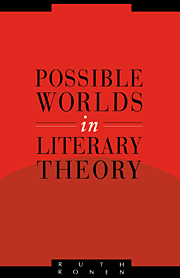Book contents
- Frontmatter
- Contents
- Acknowledgments
- Introduction
- 1 Possible worlds, fictional worlds
- 2 The possibility of fictional worlds
- 3 The Fictionality of fictional worlds
- 4 Fictional entities, incomplete beings
- 5 Fictional events and the intricacies of plot
- 6 Focalization and fictional perspective
- 7 Fictional time
- Conclusion
- Bibliography
- Index
1 - Possible worlds, fictional worlds
Published online by Cambridge University Press: 12 November 2009
- Frontmatter
- Contents
- Acknowledgments
- Introduction
- 1 Possible worlds, fictional worlds
- 2 The possibility of fictional worlds
- 3 The Fictionality of fictional worlds
- 4 Fictional entities, incomplete beings
- 5 Fictional events and the intricacies of plot
- 6 Focalization and fictional perspective
- 7 Fictional time
- Conclusion
- Bibliography
- Index
Summary
This chapter will reconstruct and examine the motivation and logic behind the conceptual link between possible worlds and fictional worlds. I will attempt to motivate this link both in terms of the more or less apparent properties of possible worlds that appeal to literary theorists, and in terms of more general disciplinary considerations (concerning the philosophical discipline in particular) that may further justify the attempt at interdisciplinary exchange around the concept of possible worlds.
My intention in this chapter is mainly to explain why the interdisciplinary link between the possible worlds framework and the problem of fictionality is fundamental to the nature of both although the productivity of this link has certain limitations. My first concern would be to reveal the basic and most obvious similarities between possible and fictional worlds thus formulating and explaining the initial attraction possible worlds hold for literary theory, and to reveal the advantages gained by literary theory from marrying possible with fictional worlds. I would secondly discuss the motivations for tying fictionality with possible worlds in view of more global disciplinary concerns, thus providing at least a partial explanation as to how and why fiction has become a relatively important object of philosophical discussions. Hence, although the connection between fictionality and the philosophical concept of possible worlds is far from self-evident, I intend to deal here with what philosophy has to offer on the subject of fiction which would account for the penetration of possible worlds' talk into the literary discourse about fictionality.
- Type
- Chapter
- Information
- Possible Worlds in Literary Theory , pp. 17 - 46Publisher: Cambridge University PressPrint publication year: 1994



